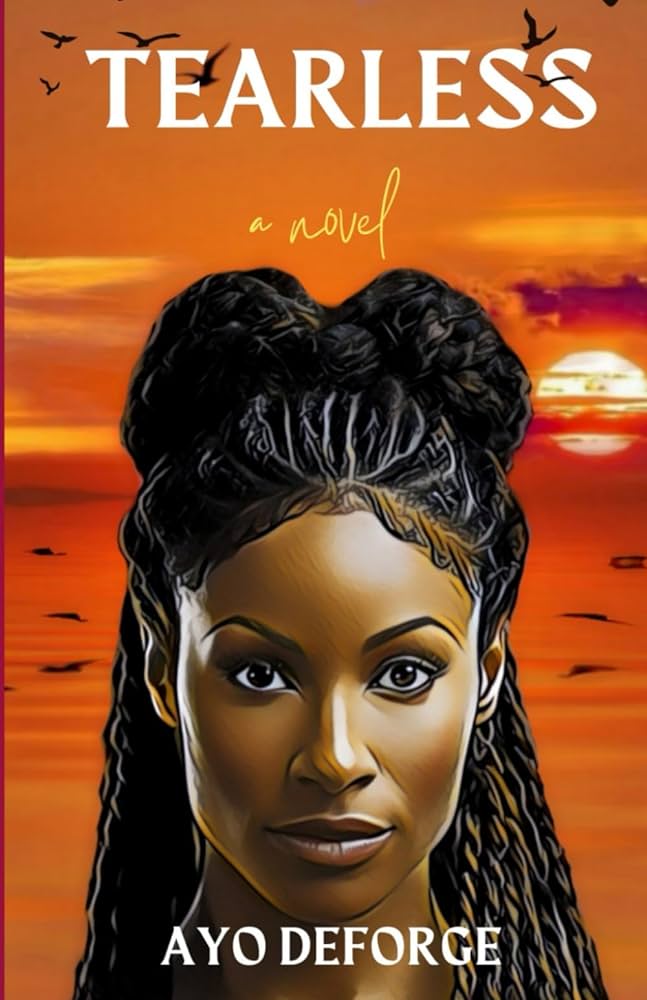
Synopsis
TEARLESS is a deeply compelling portrait of twenty-four year old Lami’s self-discovery and emotional coming-of-age. It is also a passionate and unflinching tale of interracial love. It weaves together two narrative threads that tend to themes of love, loss, fatherlessness and identity with grace and confidence.
The story follows the journey of Lami Davies who struggles to reunite her separated siblings and rise above her trauma.
Lami is obsessed with finding her little sister whom she lost touch with at the age of twelve after her mother’s passing. Her abusive father, in a heart-wrenching act, separated the children, placing them in the care of different relatives. The youngest, Tutu, was sent to live with a distant aunt in England. In Lami’s quest to reunite her family, we see how her childhood experiences influence her interactions as an adult. Her story will offer hope to all readers who are battling to let go of past trauma in order to prevent it from spilling into the present and the future.
"...there is so much to unpack." — Roving Bookworm
Praises for Tearless
Ayo Deforge does an exceptional job in exploring thetheme of grief, offering a powerful and nuanced portrayal of its ability to fracture a family. Tearless evokes a profound yearning to repair shattered connections, leaving readers deeply moved.
– Othuke Ominiabohs, author of A Conspiracy of Ravens
Ayo Deforge takes the reader on an emotionally-charged journey in Tearless. The story does not only drag you in and hold you captive until the last full-stop, but it also asks questions of your feelings, your compassion, your humanity, such that long after you’re done reading, you’re still carrying the main character in your heart and wondering about her.
– Ibrahim Babátúndé Ibrahim, winner of the Quramo Writer’s Prize 2022
Tearless is graceful, colourful and memorable. It effortlessly brings to life Lami’s person: her fear, laughter, joy and love. In Tearless, characters sneak up on you, so by the time you’re done reading, it’s more than just a book or characters. It becomes personal and you begin to think about the people you met in the book.
– Deborah Oluniran Adeniyi, writer and editor
The characters in Ayo Deforge’s rich episodic novel bring to life a melting pot of metropolitan cultures as their story travels between Lagos and Paris, past and present, young and old, traditional and trendy. The author’s fresh and lively take on the human condition invites us to plunge into a world that will be new to many, yet, Tearless transcends its unique mise en scene to remind us of the universal joys of friendship, the importance of family and the redemptive power of love.
– Geoff Mead, author of Coming Home to Story: Storytelling Beyond Happily Ever After
With Tearless, Ayo proves she has a full grasp of human experiences. She weaves this story with beautiful and smooth language.
– Chukwuemeka Famous, author of We Will Live Again
In Tearless, Ayo Deforge reveals the sad truth of the World Health Organization’s (WHO) 2022 data on child abuse.
Through Lami Davis’ compelling story, the author reveals these startling statistics: “Nearly 3 in 4 children – or 300 million children – aged 2–4 years regularly suffer physical punishment and/or psychological violence at the hands of parents and caregivers”.
Lami bravely shares her traumatic experience with her abusive father and explores the profound impact it had on her life and the lives of her siblings. This compelling book confronts the quiet echoes of a pervasive problem and challenges readers to confront and address the hidden struggles of so many.
– Oyin Olugbile, author of SANYA
Read an Excerpt
Present day
After three days of careful deliberations, I went to watch Nicolas play football on Wednesday evening.
The sun had gone down by the time I arrived in a taxi at the venue. Bright white halogen lamps illuminated the five-a-side pitch. The small stadium could take about five hundred people, but only three of us were there watching the match. The other two spectators, both male, sat several seats away, but close enough that I could hear them commenting on the game.
Behind us, Alfred Rewane Road was busy with rush hour traffic—okadas honked rudely, cars halted with sudden squeals of brakes and sirens shrieked as ambulances, cash-carrying bullion vans and convoys zoomed past. The air remained thick with the afternoon heat and from time to time, a pleasant breeze brushed past, bringing a little relief.
As the players ran up and down the field, I thought about Fola and wondered what he was doing. I wondered if he had friends at the university and if he played football with them. I wondered if he ever thought of the times we played together in the corridor of the flat using balloons because Papa forbade Mama from buying us footballs. We would collapse with laughter each time a balloon burst, before blowing air into another one.
I pulled my phone out of my handbag and sent him an SMS. ‘Hello from Lagos. I’m thinking about you,’ when what I wanted to write was, Hello from Lagos. I miss you so much. I love you.
In my family, we had never said or written that we missed each other, let alone that we loved each other. By the time the game was over, I still had not received a response from Fola. I’d dozed off a dozen times and mosquitoes had feasted on my legs.
After Nicolas introduced me to some of his friends who all called him Nico, we got into his SUV and headed to a small restaurant in Ikoyi. His car was as shiny on the inside as it was on the outside. It looked and smelled brand new. Riding in a 4X4 on Lagos roads was a luxury. Unlike with smaller cars, you didn’t feel violated when you bumped up and down over speed bumps and potholes.